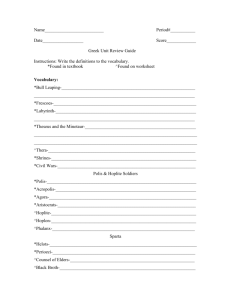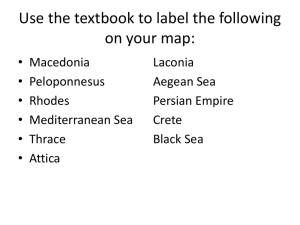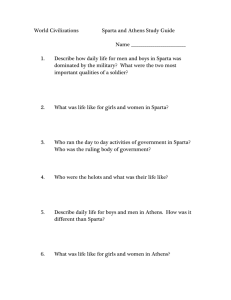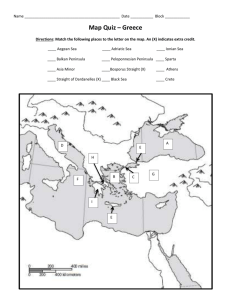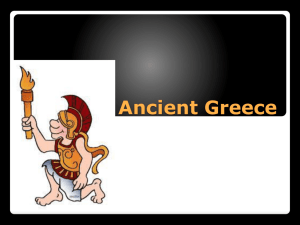Chapter 7 - Tewksbury Township Schools
advertisement
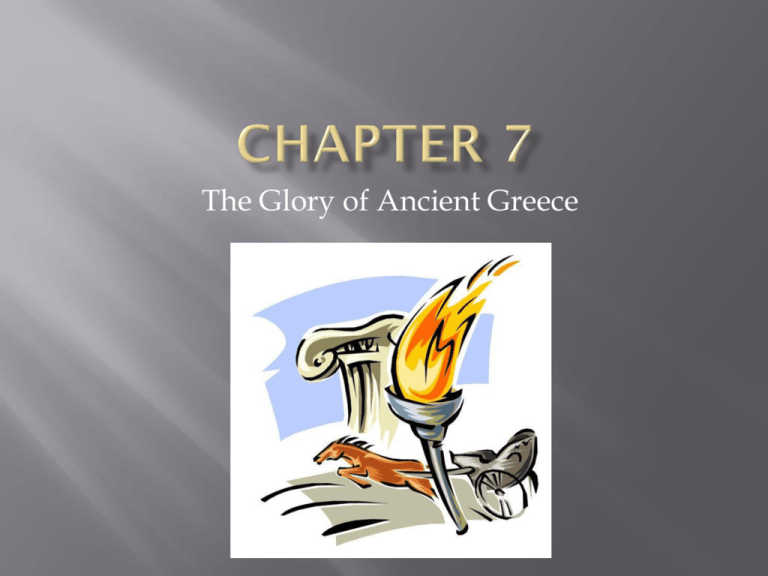
The Glory of Ancient Greece What is your routine on a typical weekday? School-age boys in Athens would have a full day of activities School during the day – education was very important to Athenian boys and men They would write lessons on their wax-covered wooden tablets – a lot different from pens, paper, laptops, and iPads! Athletic activities after school Wrestling Discus Unfortunately, girls did not go to school in Greece – they learned to work around the house and helped their mother with chores Men were active in politics and society in Athens – remember, they were PROUD to be part of Athenian democracy! Agora – a public market and meeting place The agora was the center of Athens public and social life The market was held outdoors due to the mild climate of Greece All Greek cities had agoras, but Athens had the largest Agora in Athens located near the Acropolis The Agora became a place to for men to talk about politics, philosophy, and community events Vendors (a seller in a market) sold goods in the Agora Buyers and sellers would bargain for the best price Streets were lined with shops and stands Vendors sold food, along with materials such as wool, pottery, hardware, cloth, and books The Agora was the center of social life for Greeks What places have you been to that are similar to the ancient Agora? Temples and government buildings lined the outside of the Agora, making them convenient Athenians admired beautiful architecture Classical Greek architecture style influences modern architecture, including in United States Most private homes were plain and simple Made of mud bricks Rooms were set around an open courtyard The courtyard was the center of the household Other rooms included the kitchen, dining room, bedrooms, storerooms for goods Homes for the wealthier citizens had bathrooms, using water carried from a public fountain Typical Greek meals: Breakfast – bread Lunch – bread with olives and cheese Dinner – Fish and vegetables with cheese, fruit and honey cakes Athenians did not eat much meat, even the wealthier citizens – and the wealthy only ate meat during special religious festivals Most women spent their days at home Women did not have freedoms of men Could not take part in politics, vote, own property Only special activity they were allowed to participate in was serving as a priestess in religious groups Women would stay home and run the family Men believed that women should be protected and not out in public Women lived secluded lives – they lived quietly and took care of the house They made meals, kept track of food supply, cared for family finances, and cared for young children and slaves Only poor women worked outside the home, because they had to work to support the family Made pottery, tended sheep, manufactured cloth and wool Slavery – the condition of being owned by someone else Common in Athens As many as 100,000 slaves in Athens (almost one-third of the population) People rarely questioned slavery – it was just a way of life that they knew and were familiar with Why do you think slavery was rarely questioned in ancient Greece? If you had been living at the time, do you think you would have had a problem with slavery? Some slaves were captured by Greek armies during war Could have been foreigners or Greeks from other conquered city-states Children born into slave families automatically became slaves Slaves had few privileges Slaves had many jobs They could not be citizens No political rights or personal freedoms Did not receive education Could only be free if their master freed them or if they bought their freedom through the small tips they could receive Some worked on farms Others dug silver in mines Some helped make weapons and armor In the household, they cooked, cleaned, took care of the children, wove cloth Slaves worked so Greek men had time to participate in other activities, such as the arts and government Do Now: Write 3-4 sentences – Although slaves in Athens were treated relatively well, the condition of being owned by another human is not a pleasant thought. Yet, most people did not question slavery in Athens, because they were used to it. Is it OK to ignore something that is unfair because you are used to it? Why or why not? Give a modern-day example, possibly one from your life (or just make one up). Athenian boys would go to school and learn how they could participate in the government when they grew up. The agora, or marketplace, was the center of public life in Athens. Women would stay at home and take care of the family. Athenian boys had a full schedule School during the day – education was very important They would write lessons on their wax-covered wooden tablets Athletic activities after school Wrestling Discus Girls did not go to school in Greece Agora – an outdoor public market and meeting place Center of Athens public/social life The Agora: a place for men to talk about politics, philosophy, and community events Vendors (sellers of goods) sold food, wool, pottery, hardware, cloth, and books Most private homes were plain and simple, made of mud bricks Rooms were set around an open courtyard The courtyard was the center of the household Typical Greek meals: Breakfast – bread Lunch – bread with honey, olives and cheese Dinner – Fish and vegetables with cheese, fruit and honey cakes Athenians did not eat much meat, even the wealthier citizens – and the wealthy only ate meat during special religious festivals Most women spent their days at home, caring for the house Could not take part in politics, vote, own property They made meals, kept track of food supply, cared for family finances, and cared for young children and slaves Only poor women worked outside the home, because they had to work to support the family Made pottery, tended sheep, manufactured cloth and wool Slavery – the condition of being owned by someone else Slaves had few privileges As many as 100,000 slaves in Athens (almost one-third of the population No political rights or personal freedoms Slaves had many jobs Worked on farms, in the house, in silver mines, made weapons and armor What was life in Athens like during the Golden Age? Would you like to have lived there? Why? Living in Sparta was much different than living in Athens… Life in Sparta was harsh and cruel Spartans were tough and quiet people Frequent wars changed the way people in Sparta lived – they developed a warrior mentality Frequent wars led to Sparta’s one basic rule: Always put the city’s needs above your own needs Spartans conquered land around the city of Sparta Conquered people were called helots Helot: Slaves owned by the city-state of Sparta Helots did farm work, so Spartans could go to war Helots were treated very harshly, because the Spartans were afraid they would revolt against them There were many more helots than Spartans, but the Spartans were so strong and treated them so badly, that the helots could never gain enough power to overthrow the Spartans Contrast the treatment of slaves in Athens and Sparta. Respond: Sparta’s basic rule was to “always put the city’s needs above your own.” Do you agree with this idea? Why or why not? Spartans only wanted the healthiest people to live in their city Boys were trained for fighting from a young age and continued for 13 years At 7, boys would leave home to live in military barracks They only had one change of clothes and a thin mat to sleep on By 12, a boy would learn how to use a sword and spear Boys were encouraged to steal food to train them to fend for themselves – however, if he was caught, he would be severely punished Boys were expected to endure pain and punishment in silence Spartans became excellent soldiers At 20, a young man would become a soldier At 30, a man could participate in the assembly, a council of all male citizens of Sparta Men remained soldiers until age 60 Sparta had a king, and the council helped to make decisions in the government, which would be referred to the king Spartan Warriors Compare and contrast government in Athens and Sparta. Girls also trained in wrestling and spear throwing They would not become soldiers, but they wanted girls to be strong and healthy as well Spartan women had more freedoms than in other city-states They could own land They could take part in business Because men were busy fighting, women would sometimes have to be the head of their household In the end, though, women still had to obey men! Compare and contrast the role of women in Athens and Sparta. Spartans did not associate with other Greeks and did not travel Spartans did not value being wealthy and did not engage in trade They did not have an interest in the arts Spartan warriors were known for their skill and bravery Spartan fighters were involved in many conflicts Respond: Would you have rather lived in Athens or Sparta? Why? For much of Greece’s history, city-states fought each other The Persian Empire began to threaten Greece Persia – located where modern-day Iran is located Cyrus the Great – King of the Persian Empire By 520 B.C., Persians had gained control of Greek colonies on the west coast of Asia Minor Persians landed in Greece in the fall of 490 B.C. Persians gathered at Marathon, about 25 miles north of Athens Persian army outnumbered Athenian army 2 to 1 Athenians caught Persians off guard and attacked them furiously, winning the battle According to one historian, 6,400 Persians died, while only 192 Athenians were lost Wars with Persia distracted the Greek city-states from fighting one another, and Greece became united Believed that the gods had favored them and influenced the outcome of the wars in favor of Greece Athens emerged as the most powerful city-state Delian League – group of city-states that allied with Athens When countries become allies, they join together in a partnership Named for island of Delos, where League’s treasury was kept Soon, Athens was so powerful that they began to rule over the other city-states in the league This time of power for Athens was the Golden Age that we talked about in 6.2 Athens began to abuse its power Forced other allies to pay tribute in return for protection from Persian invasion Athens used common treasury of the Delian League to finance the Parthenon and other projects Delian League in yellow Many people in other city-states began to resent Athens’ power Sparta formed the Peloponnesian League to oppose the Delian League They turned to Sparta for protection Named after Peloponnesus, the peninsula in which Sparta was located 431 B.C. – Sparta and its allies fought against Athens and its allies Began Peloponnesian War – a 27-year long conflict between Athens and Sparta Athens had a powerful navy and lots of wealth Sparta was located inland, and could not be attacked from the sea, so Athens’ navy was useless Spartans only had to march north to attack Athens When Sparta invaded Athens, Pericles had people from the surrounding areas move inside the city walls, creating overcrowding and plague Plague – widespread disease In 5 years, one-third of the people in Athens had died from it, including Pericles Sparta made peace with Persia and they became allies In 405 B.C., Sparta and Persia made a blockade of the harbor that supplied Athens with food Blockade: an action taken to isolate the enemy and cut off its supplies Spartans surrounded and closed the harbor where Athens received food shipments Athens surrendered in 404 B.C. Spartans knocked down Athens city walls, destroying its empire What did Greek city-states do to overcome oppression by Athens? Compare and contrast Athens and Sparta. Why were they so different from each other? As a group, brainstorm five words that describe the concept of slavery. As an individual, write one sentence that describes the concept of slavery. Use one of the vocabulary words on the board. Make a chart that compares slavery in Athens and Sparta. List at least 2 bullet points on each side. Athens Sparta • Slaves were sometimes • Helots were treated very treated as part of the badly and beaten family • Helots did the hard labor • Slaves worked in the for the Spartans home (easier conditions) • Helots outnumbered and also in the silver Spartans 3-to-1 mines (harsher conditions) • Free people in Athens outnumbered slaves 2-to1 Read the following passage about American slavery. “Due to the fact that Africans were not thought of as humans, but as property, they did not have the rights that whites enjoyed. Many of the slaves were beaten so severely that their injuries were life threatening. The effect of being beaten brutally or seeing someone else beaten could cause mental and emotional scars that would never go away. This shows that not only was slavery physically abusive, but also mentally abusive. Slaves suffered physical pain, but also the emotional and mental pain they experienced due to inhumane treatment of themselves and other fellow slaves on the plantation caused them to be scarred for life.” Now answer this question in one paragraph: Do you think that American slavery was more similar to slavery in Athens or Sparta? Why? Write 3-4 sentences on this topic: Why is it wrong to treat humans as “sub-human,” or below the level of a human (worse than an animal)? Do you believe that is what happened with American slavery? How about in Athens and Sparta? Slavery continued on in Greece for hundreds of years, and when the Romans took over Greece, slavery still existed in the Roman Empire. In the United States, it was not until 1865 that slavery was officially made illegal by the 13th Amendment to the Constitution. Sparta was a powerful city-state that emphasized fighting and strength over education and wealth. Greek city-states united in order to defeat the invading Persians. The Spartans eventually defeated greedy Athens in the Peloponnesian War. Living in Sparta was much different than living in Athens… Life in Sparta was harsh and cruel Spartans lived to fight, developing a tough, warlike mentality Sparta’s motto: “Always put the city’s needs above your own” Sparta conquered much land and took prisoners as slaves Conquered people became helots Helot: Slaves owned by the city-state of Sparta (typically did farm work) Helots were treated very harshly by the Spartans Spartans only wanted the healthiest, strongest people to live in their city Boys were trained for fighting from a young age Age 7: Left home to live in military barracks in harsh conditions Age 12: Learned how to use a sword and spear Boys were expected to endure pain and punishment in silence Result of the training: Spartans became excellent soldiers Age 20: Entered the army of Sparta Age 30: A man could participate in the assembly, a government of all male citizens of Sparta Sparta had a king, and the council helped the king to make decisions in the government Age 60: A man could retire from the army Girls also trained in wrestling and spear throwing They would not become soldiers, but they wanted girls to be strong and healthy as well Spartan women had more freedoms than in other city-states (even though men were still in charge) They could own land and conduct business Spartans did not associate with other Greeks and did not travel Spartans did not value being wealthy and did not engage in trade They did not have an interest in the arts Spartan warriors were known for their skill and bravery Spartan fighters were involved in many conflicts The Persian Empire began to threaten Greece Persia – located where modern-day Iran is located Persians landed in Marathon, Greece in 490 B.C. Persian army outnumbered Athenian army 2 to 1 Athenians caught Persians off guard and attacked them furiously, winning the battle 6,400 Persians died, while only 192 Athenians died Wars with Persia distracted the Greek city-states from fighting one another, and Greece became united Greece eventually defeated mighty Persia Believed that the gods had favored them Athens emerged as the most powerful city-state Delian League – group of city-states that allied with Athens Named for island of Delos, where League’s treasury was kept Soon, Athens was so powerful that they began to rule over the other city-states in the league This time of power for Athens was the Golden Age that we talked about in 6.2 Athens began to abuse its power Forced other allies to pay tribute in return for protection from Persian invasion Athens used common treasury of the Delian League to finance the Parthenon and other personal projects Delian League in yellow Many people in other city-states began to resent Athens’ power Sparta formed the Peloponnesian League to oppose the Delian League They turned to Sparta for protection Named after Peloponnesus, the peninsula in which Sparta was located 431 B.C. – Sparta and its allies fought against Athens and its allies Began Peloponnesian War – a 27-year long conflict between Athens and Sparta Athens had a powerful navy and lots of wealth Sparta was located inland and had a powerful army Athens’ navy was useless against landlocked Sparta When Sparta invaded Athens, Pericles had people from the surrounding areas move inside the city walls, creating overcrowding and plague (widespread disease) Sparta made peace with Persia and they became allies In 405 B.C., Sparta and Persia made a blockade of the harbor that supplied Athens with food Blockade: an action taken to isolate the enemy and cut off its supplies Spartans surrounded and closed the harbor where Athens received food shipments Athens surrendered in 404 B.C. Spartans knocked down Athens city walls, destroying its empire Food shipments would come in here Please write down the week’s assignments on the Assignment Board. Now, write 3-4 sentences: From what you have learned so far, how has Greek culture spread? How has Ancient Greece influenced modernday America? Macedonia is north of Greece King Philip of Macedonia and his son, Alexander, studied Greek and considered themselves Greek Alexander studied with Aristotle He believed that Greeks were a superior people and deserved to rule However, Macedonians were viewed by Greeks as barbarians (wild, uncivilized people) Why do you think that Alexander the Great believed that Greeks were a superior, or better, culture, even though he was not Greek himself? Have you ever wanted to be part of something because you admired it so much? Macedonia was poor and divided into small areas before Philip – it was not a unified country Philip came into power in 359 B.C. He united Macedonia He made an army even stronger than Sparta’s He allied with Greek city-states by threatening or bribing them Philip conquered Greece by 337 B.C. Philip wanted to conquer Persia next In 336 B.C., before he could, he was assassinated Assassinate – to murder for political reasons Philip’s son Alexander became king at age 20 Discuss with your group: Do you think a 20year old is prepared to be the king of a nation? Why or why not? Make a list of 5 skills that are needed to rule over a large group of people. At a young age, Alexander became a good soldier Alexander invaded the Persian Empire Persia had gotten weaker over the years since losing to Greece, but it was still huge Alexander led his army through Asia Minor, Judaea, Egypt, and Babylon (Persia’s capital city) Between 334 and 323 B.C., Alexander conquered Persia, Egypt, and led his army all the way past the Indus River He became known as Alexander the Great because of his great conquests Alexander named cities after himself wherever he went Alexander was smart and energetic He was very motivated and pushed his troops to be motivated Troops complained that he was too hard on them, but they obeyed Alexander Alexander never lost a battle Finally, his tired troops refused to advance into India Alexander was angry, but he turned back On the way back, Alexander caught a fever and died in 323 B.C. What is the danger in conquering too much territory and spreading your army too thin? After Alexander died, his empire was split up into three kingdoms Each kingdom ruled by one of Alexander’s former army commanders One commander ruled Greece and Macedonia One ruled Egypt One ruled Persia After the army commanders died, their sons and grandsons fought to inherit the kingdoms for many years, causing chaos Many people left Greece to live in the cities that Alexander had conquered These cities were called Hellenistic Kingdoms Hellenistic: A word used for Greek history and culture after the death of Alexander the Great Hellenistic cities were modeled after Greek cities Greek kings ruled Greeks who moved there had the best jobs Greek temples and agoras were built in the cities Greek plays were performed in theaters Greek language was spoken in the cities Greatest of all Hellenistic cities: Alexandria, Egypt Alexander founded the city in 332 B.C. Located on the Nile River Became the capital of Egypt Became a center of business and trade Had the largest library in the world Advancements were made in math and science in Alexandria Euclid – developed geometry in 300 B.C. Scientists in Hellenistic times knew the earth was round, which was a new concept at the time Used proofs to explain mathematical laws of geometry Eratosthenes calculated the distance around the earth Archimedes – discovered that levers and pulleys could be used to lift heavy objects He said “Give me a lever large enough, and I will lift the earth.” Which of these advancements in math and science have you learned about in school? What do you know about them? How have you used them? To summarize your understanding of Ch. 7.3, please complete the following activities on page 222: Target Reading Skill Comprehension and Critical Thinking, #1 and #2



